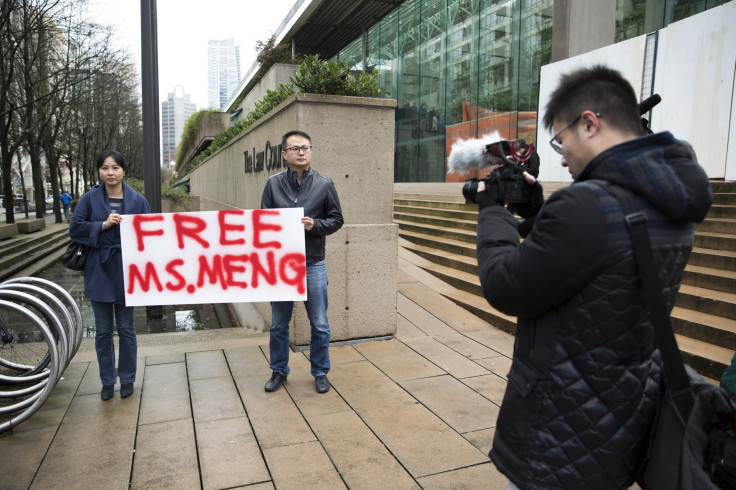Meng Wanzhou Extradition: US To Formally Request Canada To Extradite Huawei CFO

In a move that worsen the already tense relationship between the United States and China, a Canadian diplomat revealed Monday the U.S. could soon make a formal request for the extradition of Meng Wanzhou, chief financial officer of Chinese telecommunications company Huawei. Meng was arrested Dec. 1 at Vancouver International Airport in Canada during a layover for her alleged role in covering up the violations made by the company against U.S. sanctions on Iran. The arrest was made at the behest of the U.S. authorities.
David MacNaughton, Canada's ambassador to the U.S., told the Globe and Mail on Monday the U.S. had already asked for Meng's extradition, but had not made a formal request yet. However, the deadline for making the request is Jan. 30, 60 days since Meng's arrest, CNBC reported. Even though MacNaughton didn't specify any time when the formal request from the U.S. was expected, there isn't much time left before the deadline.
Following the media reports about the possibility of Meng's extradition request, the Chinese government warned the U.S. and Canada of consequences.
According to South China Morning Post, Chinese Foreign Ministry spokeswoman Hua Chunying said in a press briefing, “China will take action in response to measures taken by the U.S."
The arrest and the subsequent release (on bail, with conditions) of 46-year-old Meng — who is one of China’s most reputed woman and daughter of Huawei’s founder Ren Zhengfei — created further ripples in the ongoing trade tensions between both the countries. The timing of the incident raised questions as the arrest took place the same day when President Donald Trump and Chinese President Xi Jinping were dining — to discuss and curb trade conflicts between the countries — on the sidelines of the Group of 20 summit in Argentina.
According to a CNN report, the White House said Trump and his close aides were not aware about any request to arrest Meng ahead of the dinner with Jinping. In an interview later with Reuters, Trump said he would intervene in the case if it would benefit the ongoing trade tussle between the world's two biggest economies.
“Whatever’s good for this country, I would do,” Trump said. “If I think it’s good for what will be certainly the largest trade deal ever made – which is a very important thing – what’s good for national security – I would certainly intervene if I thought it was necessary,” he told Reuters.
The U.S had already been skeptical about Chinese government's alleged attempts at espionage using telecommunications equipment made by Chinese companies. In August, Trump banned Huawei and ZTE technologies to be used by the government, citing national security threats. Australia and New Zealand also followed suit, and banned Huawei equipment for 5G networks in the countries. The United Kingdom was also deliberating taking some action against the company, but no decision was made so far.
Meng was released from custody Dec. 11 by a court, after she posted bail of $10 million and surrendered her passport to the authorities. She is presently staying at one of her two homes in Vancouver, and would fight a legal battle against her extradition. Her next trial was scheduled for Feb. 6, according to a report by CNN.
Following the arrest, Chinese media pilloried the move, stating the U.S. wanted to impair China’s ability to compete with it in the field of technology. An editorial from the state-run Global Times said the U.S. was taking a “despicable rogue's approach as it cannot stop Huawei's 5G advance in the market.”
Sen. Ben Sasse (R-Nebraska), hailed the arrest and said it was "for breaking U.S. sanctions against Iran." He added, "Sometimes Chinese aggression is explicitly state-sponsored and sometimes it's laundered through many of Beijing's so-called 'private' sector entities," CNBC reported.
Huawei denied all allegations against it and said it complied with all the rules put forth by the United Nations, the U.S. and the European Union, and that it posed a pragmatic threat and gave solid competition to the U.S. when it comes to technology. In 2018, Huawei became the world's second-largest smartphone maker, behind Samsung, and sold more phones than Apple, according to an International Data Corporation report.
© Copyright IBTimes 2024. All rights reserved.





















